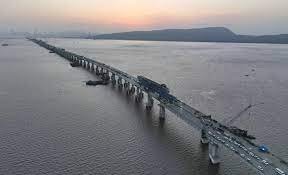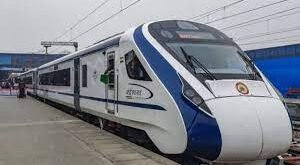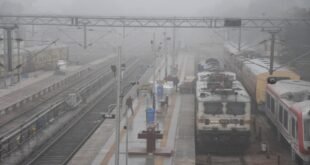
Mumbai witnessed a major milestone in its infrastructure with the inauguration of the Mumbai Trans Harbour Link (MTHL), also known as the Atal Setu, by Prime Minister Narendra Modi. Stretching over 21.8 kilometers, the MTHL now stands as India’s longest sea bridge, connecting Sewri in Mumbai to Nhava Sheva in Raigad district. The inauguration ceremony showcased the significant achievement in the country’s infrastructure sector.
Constructed at a cost of ₹17,840 crore, the MTHL boasts six lanes, with 16.5 kilometers of the bridge extending over the sea. The inauguration event was attended by key officials and dignitaries, highlighting the importance of this project in enhancing connectivity and reducing travel time between Mumbai and Navi Mumbai. The bridge is expected to cut the travel duration from an hour and a half to approximately 20 minutes.
Named after former Prime Minister Atal Bihari Vajpayee, the Atal Setu is not only a symbol of connectivity but also a technological marvel. It is India’s first sea bridge to implement an open-road tolling system, allowing vehicles to pass through toll booths at speeds of up to 100 kilometers per hour without stopping. This innovative approach aims to streamline traffic flow and improve the overall commuting experience.
During the construction phase in 2018, the Mumbai Metropolitan Region Development Authority enlisted the expertise of IIT Bombay to ensure the bridge’s structural integrity. The design takes into account its location in a moderate earthquake damage risk zone, with the bridge built to withstand earthquakes of up to 6.5 magnitudes.
The MTHL holds strategic significance by providing faster connectivity to both the Mumbai International Airport and the upcoming Navi Mumbai International Airport. Additionally, it is expected to reduce travel time between Mumbai and key destinations like Pune, Goa, and South India. The bridge is poised to enhance economic growth by facilitating smoother transportation and easing traffic congestion.
While the MTHL marks a significant achievement, concerns have been raised about the toll charges. The toll for cars on the bridge is set at ₹250 for a single journey and ₹375 for a return journey, sparking criticism from opposition parties. However, officials argue that the fuel savings resulting from the reduced travel time would offset the toll costs.
The MTHL is scheduled to open to commuters, with a speed limit of 100 kmph for four-wheelers. However, certain vehicle categories, including two-wheelers, auto-rickshaws, tractors, animal-drawn vehicles, and slow-moving vehicles, will not be permitted on the bridge, emphasizing the need for responsible and efficient usage of this newly inaugurated infrastructure marvel.
Sources By Agencies
 Digital Scoop India Official Platform of Digital Scoop India Featuring Latest & Best News #Articles #Bytes #Entertainment #DigitalScoopMagazine
Digital Scoop India Official Platform of Digital Scoop India Featuring Latest & Best News #Articles #Bytes #Entertainment #DigitalScoopMagazine



